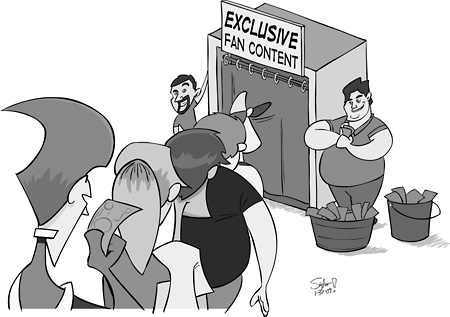Rob Staeger interviews Shayna Marchese about her webcomic, Voids, at Blog@Newsarama.
Also at Blog@, Troy Brownfield has a few quick questions for David Gallaher, whose High Moon Zuda comic will be released in print form in October.
Larry Cruz talks to Neil Kleid about his erstwhile Zuda comic, Action, Ohio, and the experience of having a webcomic at Zuda versus Shadowline, Action’s current home.
Joamette Gil interviews Dava Butler, the creator of the My Little Pony fumetti Kimono’s Townhouse, at Manga Punk.
At Talk About Comics, Shaenon Garrity interviews Alexander Danner and Edward J. Grug III about Gingerbread Comics.
Brad Guigar rounds up the webcomics panels at NYCC at Webcomics.com. Brad also addresses an issue that is likely to become more prominent in the near future: Long-form webcomics. His post brings out an interesting issue, actually: Coming from the gag-a-day context, he recommends that each page of a comic be “satisfying,” with some sort of hook or cliffhanger on each page. That seems like it would change the pacing in a way that might not work so well if one reads a big chunk of the comic at once—a clear case of the medium affecting the message.
The notion of an online exhibition of webcomics makes Johanna Draper Carlson scratch her head at Comics Worth Reading, but there is an explanation in the comments section.
If you’re curious about what the world might be like if chickens demanded equal rights, you can download a free copy of issue 1 of Elmer, by Gery Alanguilan, at his website. You’ll need the CBR comics reader to read it, but you can get that there as well. The dead-tree version of the first issue is sold out, which is actually a pretty good reason to put it on the web.
At Manga Xanadu, Lori Henderson writes about Tokyopop’s foray into e-book formats, particularly the e-reader. One big problem: They only have one volume of most series available.
Reviews
Larry Cruz on Femmegasm (The Webcomic Overlook)
Greg McElhatton on the print version of Never As Bad As You Think (Read About Comics)
Ren C. Henry on Sorcery 101 (Manga Punk)




